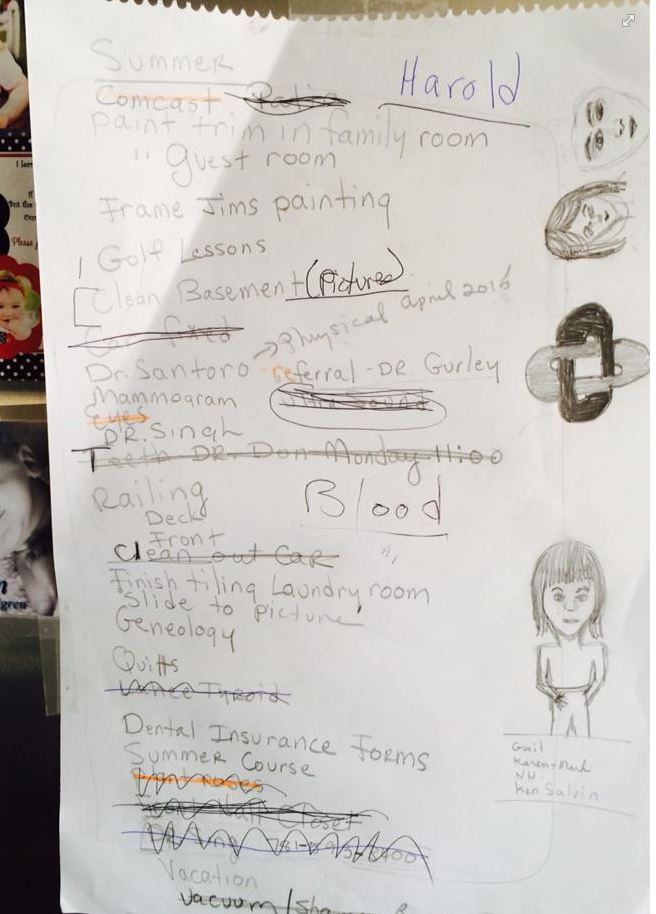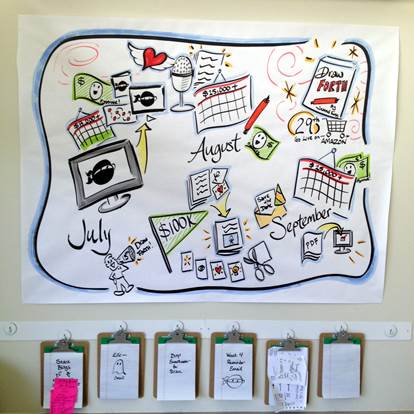When I was in third grade, my desk was so cluttered that stuff used to fall out of it on to the floor. This hasn't improved much with time -- my desk is still messier than most hamster cages, though thankfully it's less smelly.
But that doesn't mean I'm unproductive and bad at my job.
With time, I've learned there's no magic fix that will make me an organizational wizard. And I'm not alone-- Ben Franklin spent the greater part of his adult life drafting out solutions, never sure he'd found the perfect one.
But that doesn't mean we give up.
As a small business owner, you're faced with a constant stream of things to do. Harry Potter isn't going to wiggle his wand and organize your life, so you've got to adopt some basic strategies that work for you.
With so many apps, tools, and 'hacks', it's tempting to look for a quick fix, but there's no magic solution. So, stop the hunt and get back to basics.

So, let's learn from other small business owners who are getting back to basics.
Convene Before Bed or At The Start of Each Day
Before you begin your work day, clear your head and write down what needs to be done. You can do this at night or in the morning.
'I'm a huge believer, even with all the online tools and apps I use, of writing down before I go to bed what I want to accomplish the next day,' says Mike Kawula, Founder of Self Employed King. 'I prioritize by deciding what will have the most income-producing results down to tasks that have to be done but aren't crucial.'
Mike completes his must-dos first thing in the morning. That way, if he gets interrupted (which happens often for busy entrepreneurs), the most important tasks have been taken care of.
Have a Daily Touchbase
If you manage a team, how do you get everyone on the same page? Apps like Trello, Yammer, and Basecamp can help you communicate, but you also need to talk to each other.
Communicating face-to-face (even on Skype or Google Hangout) gets a team in sync. A 10 or 15-minute meeting can make all the difference and help you delegate tasks.
'I run the G2 Crowd technology team, and an important piece for us is a daily scrum meeting,' says Mike Wheeler, CTO and Co-founder of G2 Crowd. 'It's just a 15-minute check-in to make sure that we are in sync, and that any blocking actions are clearly communicated.'
Delegate Your Stuff to Others
It's hard to stay organized if you're taking on too much. Sometimes the only way to claim back your time is to unload.
'Get your hands out of answering every customer service call, submitting the bi-weekly paychecks information, and monitoring health insurance,' says Pat Petitti, Co-founder of HourlyNerd. 'While these are critical, the leader of your organization should be focusing efforts on more strategic, high impact initiatives.'
That doesn’t mean stepping away entirely. You should only delegate work when you know that it can get done right, which could mean double-checking and hand-holding as your new hire learns the ropes.
'I expect that I can ramp down 20-30% of my effort on a given task each week once I’ve hired someone,' says Pat. 'I still set up regular check-ins to make sure I’m there for advice and guidance, but if you’re a good leader you’ll be able to coach up your hires quickly.'
Hang Your Objectives on The Wall
If you write down your goals, but then stuff them into a filing cabinet or in a folder on your computer's desktop, are you holding yourself accountable?
Take some inspiration from Jeannel King, Graphic Facilitator and Stick Figure Strategist, who hangs her objectives on her office wall.
'I draw out my objectives for the quarter and post it in my office. Nothing fancy, just good enough for me to know what I want to accomplish,' says Jeannel. 'This keeps the 'big picture' goals and outcomes visible, and keeps the plan 'living' with me instead of dying a quiet and dusty death in a binder on a bookshelf somewhere.'

You don't need Jeannel's artistic skills to make this a reality. Creating something colorful, even if it's basic, will remind you that there's stuff to get done.
Use Old-Fashioned Pen and Paper For To-Do Lists, Calendars, and Notes
There are more productivity apps than yellow jackets swarming around spilled fruit punch, but old-fashioned pen and paper may better serve you.
'I'm mostly a digital guy, but I still rely on handwritten notes and memos to organize myself,' says Tony Ellison, Founder and CEO of Shoplet. 'For some reason, to-do list and reminders resonate more clearly with me when I write them down.'
You can be as random or deliberate about what you record, as long as you find a strategy that works for you.
'Nothing is more stress inducing than an enormous list of incomplete tasks that might never be finished,' says David Barrett, Co-founder and CEO of Expensify. 'Rather, start every day with a blank sheet of paper and write down the most important things to get done -- only look back at previous days if you run out of ideas.'
Choose Some 'Dooms Days'
What if you selected one day where you completed all the unsightly, boring, and you-don't-wanna-do-'em tasks that simply need to get done?
'One thing that works for me is having 'Dooms Days,'' says Layla Blaza, Founder of Art 2 Omega. 'These are pre-determined days in a month where I must complete the things I don't want to do like bookkeeping and cold-calling.'
Designating certain days to get stuff done can prove very productive, whether they occur once a week, month, or on some other schedule. The only downside is that you might dread the days. 'I make sure I have some wine chilled that night,' says Layla.
Use Simple Technology
Basic strategies work, but so do simple technologies that we use every day. Koby Bryan, Founder of Koby Consulting, relies heavily on Google Calendar to stay on top of things.
'I have a shared calendar that I share with my team, so they know where I am and what the theme of the day is because I am usually offsite with a client, or having face-time with prospective clients,' says Koby. 'For those of us (including myself) that have Macs in addition to PCs, we use iCal and sync them with Google Calendar.'
Whether you rely on Google, Outlook, or your smartphone, simple apps can help you stay on top of what's important.
'Without this structure it would be chaos,' adds Koby, 'because as a small global business we juggle many tasks and wear many hats.'
Be Intentional
The key to organization is being intentional about how you spend your time. It sounds obvious, but think carefully about what you want to accomplish, and then get it done.
'I like to use a very basic diagram to help me and my team figure out what we should be doing first, second, third, and so on,' says Sandra Harris, Founder of ECOlunchbox. 'We try to identify tasks at hand by sorting them into various categories, such as very urgent tasks, including important ones and others that are urgent but maybe more administrative and not so mission critical.'
If It Works For You...
The most important part of any productivity and organizational solution is that it works for you. All of these ideas are great, but that doesn't mean they'll be your piece of cake.
'A paper calendar is fine, if that is what works for you,' says Andrea Brundage, professional organizer and founder of Simple Organized Solutions.
'White boards are wonderful ways to track timelines and to chart ideas, if they work for you. Flip charts are still highly effective for brainstorming sessions, if they work for you. Electronics are wonderful, if they work for you.'
Your Turn: What back-to-basic organizational strategies do you use? What would you recommend to others?


